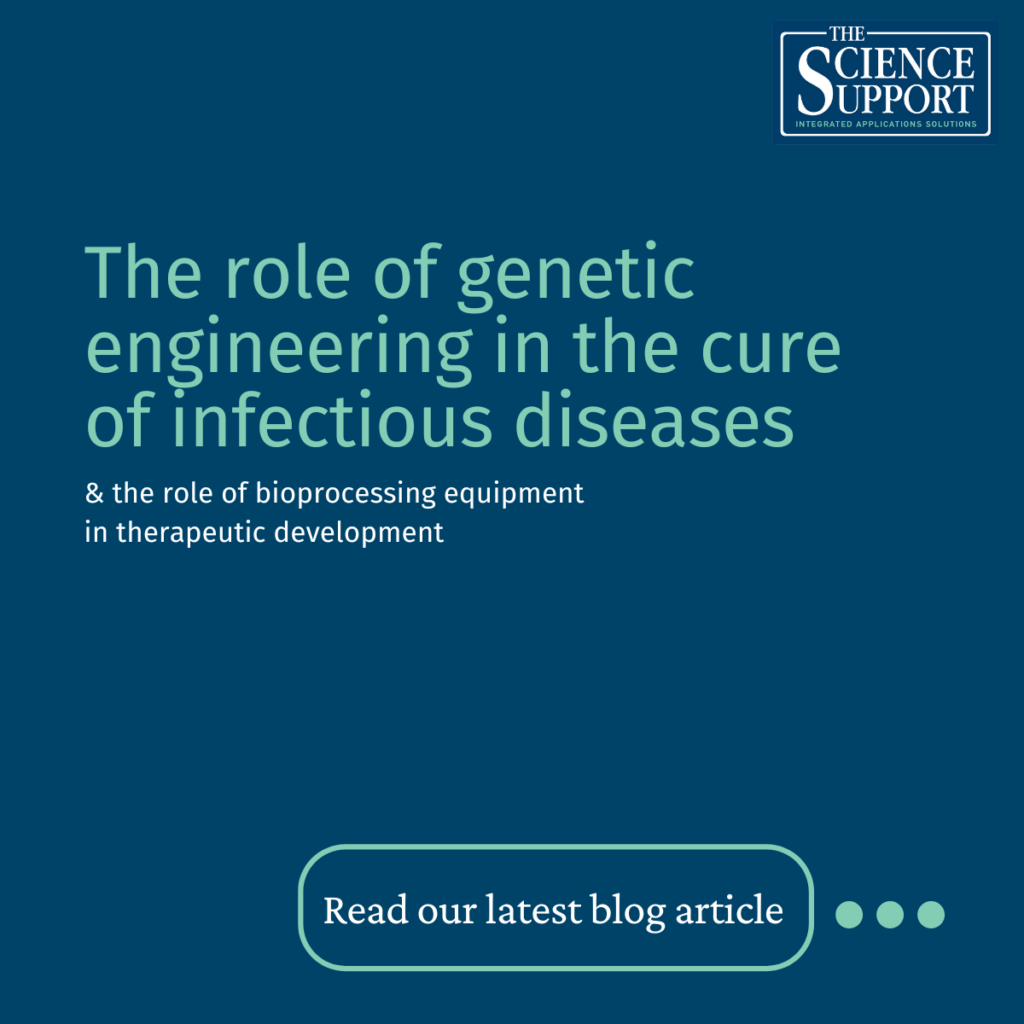Advances in genetic engineering have transformed the medical field, offering groundbreaking solutions for combating infectious diseases, like AIDS. The development of novel therapeutics and the tools that enable them have ushered in a new era of precision medicine. This article explores how genetic engineering is addressing the challenges of treating infectious diseases and highlights the critical role of bioreactors and other cutting-edge equipment in the development and production of these life-saving therapies.
Genetic engineering against infectious diseases
Genetic engineering of microorganisms, a ground-breaking field at the intersection of biology, genetics, and technology, has allowed scientists to manipulate and amplify specific genes, paving the way for numerous applications, including the fight against infectious diseases. Gene manipulation techniques like gene cloning, polymerase chain reaction (PCR), and recombinant DNA technology, have been lately supplemented by new methods to design and build – literally, to engineer – novel life forms, generally referred to as synthetic biology.
Gene editing
With gene editing techniques, such as CRISPR-Cas9, ZFNs, and TALENs, researchers can now precisely modify the DNA of pathogens, making them less virulent or even eliminating their ability to cause harm. By editing the genetic material of viruses and bacteria, scientists can weaken their ability to replicate and spread, ultimately reducing their pathogenicity.
Gene therapy
Through gene therapy approaches, researchers can introduce specific genes into immune cells, boosting their ability to recognize and eliminate pathogens. Gene therapy shows promise in treating chronic viral infections, such as HIV, by strengthening the immune system’s ability to control viral replication.
Vaccines
Vaccines have been a cornerstone of infectious disease prevention, and genetic engineering has revolutionized their development. Traditional vaccines often relied on weakened or inactivated pathogens to stimulate an immune response. With genetic engineering, scientists can now create recombinant vaccines, where specific genes of pathogens are inserted into harmless organisms, triggering a targeted immune response without causing illness. This approach has led to the rapid development of vaccines against deadly viruses like hepatitis B, human papillomavirus (HPV), and the recent coronavirus causing COVID-19.
The role of bioprocessing equipment in therapeutic development
The transition from laboratory research to scalable production of genetic therapies requires advanced bioprocessing technologies. Bioreactors and protein purification systems are integral to the process.
Bioreactors for gene therapy development
Bioreactors provide controlled delivery of nutrients and biomimetic stimuli in order to influence cell growth, differentiation, and tissue formation. They have been extensively used to promote the expansion of red blood cells, chimeric antigen receptor (CAR) T cells, induced pluripotent stem cells, and mesenchymal stem cells, all essential components of gene therapy. As regenerative medicine has matured, the number of applications has increased and bioreactors’ roles in enabling the commercialization and clinical translation of stem cell-based technologies have become more defined.
Single-use bioreactors, such as Cytiva’s Xcellerex XDR systems, are particularly advantageous, offering:
- Scalability: Efficiently transitioning from small-scale research to industrial production.
- Consistency: Maintaining uniform conditions to ensure reproducibility.
- Flexibility: Supporting diverse cell lines and viral vector types.
Purification systems for therapeutic quality
Purifying the viral vectors or proteins used in gene therapies is critical. Systems like Cytiva’s AKTA chromatography systems are designed to deliver high-purity products at scale. These systems provide:
- Precise control over separation processes.
- High-resolution analytics to ensure product quality.
- Compatibility with regulatory standards for biopharmaceutical production.
We can support your activities in genetic engineering
Thanks to our long-standing cooperation with key technology providers, we, at The Science Support, can provide you with superior integrated solutions to help you improve continuous bioprocessing at any scale. You may view our complete suite of solutions for biopharmaceutical applications here.
Sources:
Hawsawi, Y. et. Al. 2022. The State-of-the-Art of Gene Editing and its Application to Viral Infections and Diseases Including COVID-19. Front Cell Infect Microbiol. 12: 869889. doi: 10.3389/fcimb.2022.869889
Stephenson, M., Grayson, W. 2018. Recent advances in bioreactors for cell-based therapies. Bioprocessing International. 7:517. doi: 10.12688/f1000research.12533.1



